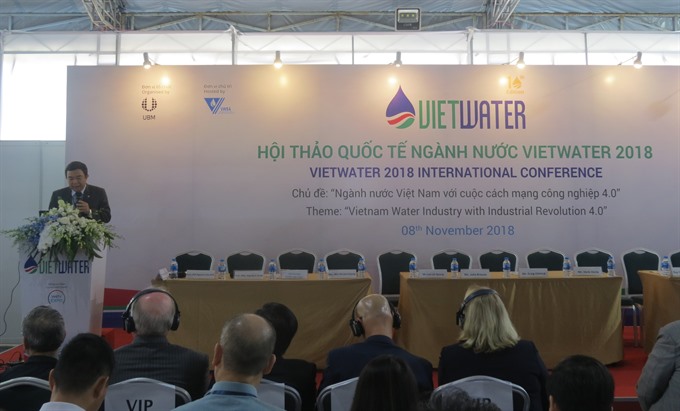 Economy
Economy

Việt Nam needs to work on implementing modern IT systems and high quality workforce training in the water supply and drainage industries in preparation for the Fourth Industrial Revolution, experts said at a conference in HCM City yesterday.
 |
| A speaker at a conference in HCM City yesterday on Việt Nam’s water industry. Experts said smart water management systems and skilled workers are needed for the development of those industries. – VNA/VNS Photo Việt Dũng |
HCM CITY — Việt Nam needs to work on implementing modern IT systems and high quality workforce training in the water supply and drainage industries in preparation for the Fourth Industrial Revolution, experts said at a conference in HCM City yesterday.
Mai Thị Liên Hương of the Ministry of Construction said Việt Nam’s water supply and drainage industry had been applying hi-tech methods and IT. However, it was facing problems such as limited funding, climate change and pollution.
Investing into smart systems for managing water distribution is crucial for sustainable development of water industries.
Nguyễn Việt Anh, director of the Institute of Environment Science and Engineering, said that Industry 4.0 technologies like cloud computing, 3D printing, AI and the Internet of Things can be used alongside data collection and processing in water supply and drainage systems. Smart equipment such as smart valves, digital data loggers and equipment to detect leakage can also be implemented.
Việt Nam’s production capability for smart water management products is still limited. Smart systems require a large amount of data, which can be difficult to gather and manage.
Supervisory control and data acquisition systems need to be upgraded for better data gathering and water network management. Databases and customer service should move away from manual paperwork and be more digitised.
Việt Nam should work towards smart water supply and drainage systems to enable efficient management of water quality and volume, weather forecasts and problem detection.
Ưng Quốc Dũng, deputy chairman of the Việt Nam Water Supply and Sewerage Association, said that, despite the fact that many firms in Việt Nam were still using low-tech systems, the implementation of 4.0 technology would impose massive changes on the Vietnamese job market. Low skilled jobs would be replaced by high skilled employees needed to run smart systems.
Firms will also have to train and hire more suitable workers and invest more in modern IT systems.
“In the future, the intelligence and talent of the workers will be the most important factor for production, so preparing a high quality workforce is essential,” Dũng said.
The education system and human resource training have to be revamped to produce workers that have the skills and creativity needed for Industry 4.0.
Many skilled workers are grouped in HCM City and Hà Nội, while more are needed in the Central Highlands and Mekong Delta.
Dũng said that to prepare for Industry 4.0, the workforce – especially in the drainage and wastewater industries, which are relatively new in Việt Nam – needs to improve on foreign languages, IT capability, teamwork, communication and other skills.
The conference was a part of VIETWATER 2018, an international exhibition for technologies and systems in water industries. — VNS




